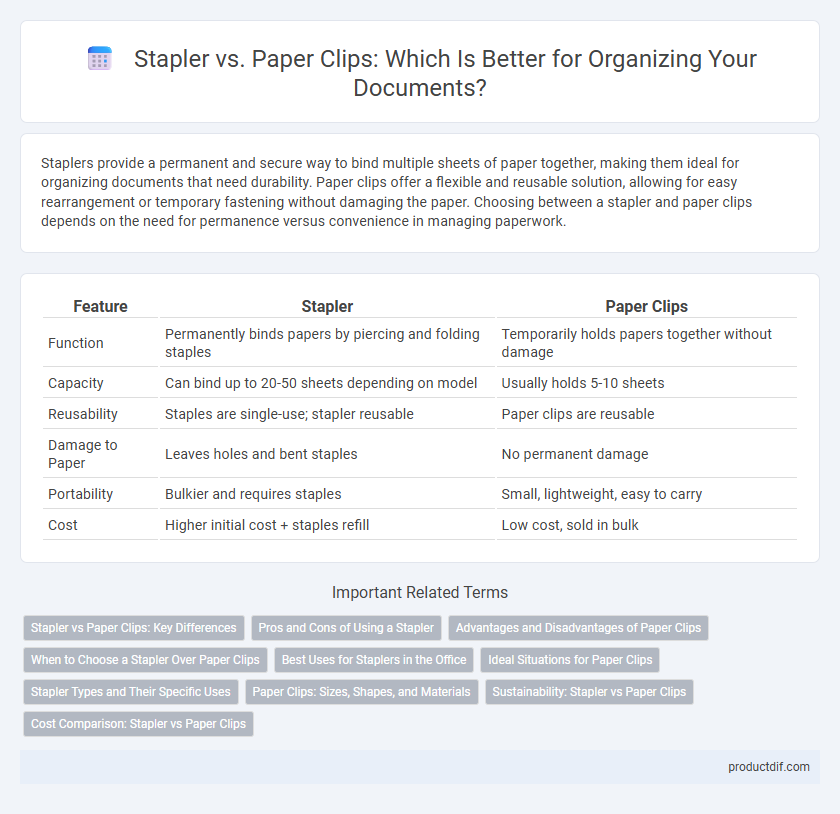Staplers provide a permanent and secure way to bind multiple sheets of paper together, making them ideal for organizing documents that need durability. Paper clips offer a flexible and reusable solution, allowing for easy rearrangement or temporary fastening without damaging the paper. Choosing between a stapler and paper clips depends on the need for permanence versus convenience in managing paperwork.
Table of Comparison
| Feature | Stapler | Paper Clips |
|---|---|---|
| Function | Permanently binds papers by piercing and folding staples | Temporarily holds papers together without damage |
| Capacity | Can bind up to 20-50 sheets depending on model | Usually holds 5-10 sheets |
| Reusability | Staples are single-use; stapler reusable | Paper clips are reusable |
| Damage to Paper | Leaves holes and bent staples | No permanent damage |
| Portability | Bulkier and requires staples | Small, lightweight, easy to carry |
| Cost | Higher initial cost + staples refill | Low cost, sold in bulk |
Stapler vs Paper Clips: Key Differences
Staplers provide a secure and permanent fastening solution by puncturing and bending paper, ideal for thicker stacks, while paper clips offer a temporary and flexible option that avoids paper damage. Staplers are more efficient for organizing documents that need long-term binding, whereas paper clips allow easy rearrangement and removal without leaving holes. Selecting between a stapler and paper clips depends on the required durability, ease of use, and document handling preferences in office and school environments.
Pros and Cons of Using a Stapler
Staplers provide a secure and permanent way to fasten multiple sheets of paper, ensuring documents remain intact during handling or storage. They offer a professional appearance and quick fastening but can cause damage when removing staples, potentially tearing paper. Unlike paper clips, staplers require staples and may jam, requiring maintenance and limiting reusability.
Advantages and Disadvantages of Paper Clips
Paper clips offer a non-permanent solution for holding documents together, allowing easy addition or removal of papers without damage, which is ideal for temporary organization. Their lightweight design and low cost make them convenient for everyday use, but they lack the strong holding power of staplers, often resulting in papers slipping apart. Paper clips can also bend easily and are unsuitable for thick stacks, limiting their effectiveness in heavy-duty binding tasks.
When to Choose a Stapler Over Paper Clips
Choose a stapler over paper clips when you need a secure, permanent binding for documents that won't be frequently separated, such as formal reports, contracts, or presentations. Staplers provide a stronger hold that prevents pages from slipping or falling apart, ideal for handling thicker stacks of paper. Paper clips are better suited for temporary grouping or frequently accessed files, while staplers ensure lasting organization and durability.
Best Uses for Staplers in the Office
Staplers are ideal for securely binding multiple sheets of paper, ensuring documents remain organized and intact during handling or transport. They provide a stronger, more permanent hold compared to paper clips, making them essential for official reports, contracts, and presentations. Using staplers in the office enhances document durability and professional appearance, reducing the risk of page loss.
Ideal Situations for Paper Clips
Paper clips are ideal for temporarily holding together small stacks of paper without causing permanent damage or leaving holes, making them perfect for documents that require frequent reorganization or sharing. They are especially useful in office environments where papers need to be quickly sorted, grouped, or ungrouped without stapling. Paper clips offer flexibility for managing loose sheets, receipts, or notes in situations demanding easy access and minimal alteration.
Stapler Types and Their Specific Uses
Staplers come in various types such as desktop, heavy-duty, and electric, each designed for specific tasks ranging from light paper fastening to binding thick stacks of documents. Desktop staplers are ideal for everyday office use, handling up to 20 sheets, while heavy-duty staplers can secure over 100 sheets, suitable for large reports or booklets. Electric staplers enhance efficiency in high-volume environments, offering consistent fastening strength and speed that paper clips cannot match.
Paper Clips: Sizes, Shapes, and Materials
Paper clips come in various sizes, typically ranging from 28mm to 50mm, designed to hold different amounts of paper securely. Shapes extend beyond the traditional oval to include butterfly, triangular, and decorative forms to enhance both function and aesthetics. Materials commonly used include steel, plastic-coated metal, and brass, offering options for durability, rust resistance, and visual appeal in stationery organization.
Sustainability: Stapler vs Paper Clips
Staplers offer long-term durability and reduce waste by securely binding multiple sheets of paper without requiring frequent replacements, making them more sustainable for heavy-duty use. Paper clips, while reusable and convenient for temporary organizing, often contribute to metal waste when lost or discarded. Choosing staplers with biodegradable or recycled staples further enhances environmental benefits by minimizing plastic and metal pollution.
Cost Comparison: Stapler vs Paper Clips
Staplers generally involve a higher upfront cost compared to paper clips, with quality models priced between $10 to $30, while paper clips are sold in bulk for just a few dollars per hundred. Over time, paper clips tend to be more economical for fastening small quantities of paper due to their low individual cost and disposability. In contrast, staplers offer a more durable and professional fastening solution but require ongoing investment in staples, typically costing around $2 to $5 per box of 1000.
Stapler vs Paper clips Infographic

 productdif.com
productdif.com